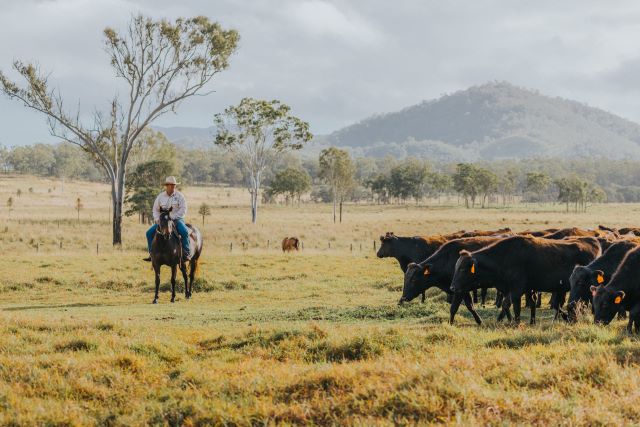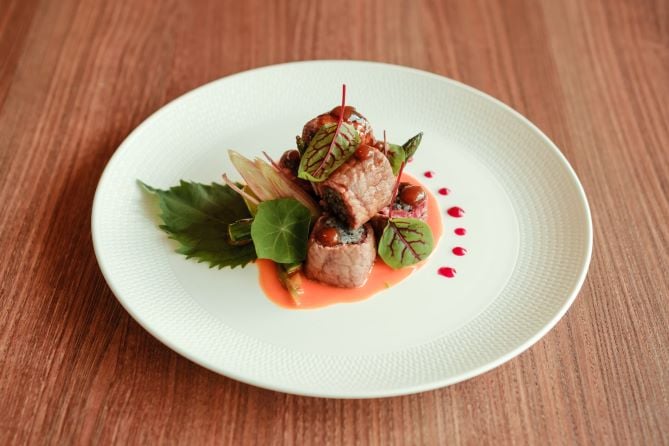Australian Wagyu Beef – Exploring a Rising Phenomena
Wagyu beef farmed in Australia is of the highest, world class, grade. Aussie Wagyu has quality and taste to a standard that many regard as equal to (or higher) than Japanese Wagyu beef.

Wagyu beef farmed in Australia is of the highest, world class, grade. Aussie Wagyu has quality and taste to a standard that many regard as equal to (or higher) than Japanese Wagyu beef.
Wagyu Beef commands the highest reverence in the world of premium beef. Renowned for its exceptional marbling, unmatched tenderness, and exquisite flavour profile, Wagyu is widely regarded as a pinnacle of culinary excellence.
Among Wagyu producers globally, Australia has emerged as a prominent force, rearing Wagyu beef of the highest grade with quality and taste to a standard that many regard as equal to (or higher) than Japanese Wagyu beef.
In the following blog we explore the fascinating world of Australian Wagyu beef, from its century-old origins, to the global demand for this premium quality beef today, including what makes Wagyu beef from Australia so special and why the key to its intense flavour lies in marbling.
The answer to the question of where Wagyu beef is from is widely known - the breed was meticulously developed over centuries in Japan. Wagyu refers to a breed of cattle developed in Japan, made famous in the Kobe region.
The clue, as they say, is in the name, as the term "Wagyu" translates to "Japanese cow" and encompasses several breeds known for their unique genetic predisposition to produce intense marbled beef.
Australian farmers have closely studied wagyu animal husbandry and genetics. The Australian herd comprises a large number of full blood Wagyu cattle whose ancestors originate from Japan. The Australian Wagyu herd is also representative of a fusion between the esteemed Japanese full bloods and specifically selected cattle strains, resulting in a crossbreed (known as F1, F2, F3 and F4 Wagyu), perfectly adapted to the Australian climate and terrain and producing high quality wagyu steak.
Essentially the premium eating quality of Wagyu beef is what stands it apart from other beef varieties. Wagyu is widely regarded as the very best, thanks to the high concentration of marbling that leads to increased tenderness and a more intense eating experience. Wagyu delivers exceptional flavour due to its softer fat composition, higher proportion of healthier unsaturated fats and finer meat texture.
The hallmark of Wagyu beef lies in its intricate beef marbling. This distinct feature refers to the fine veins of intramuscular fat content that weave through the meat, rendering it incredibly tender, juicy, and richly flavoured. The marbling in Wagyu beef surpasses that of conventional beef, contributing to its melt-in-your-mouth texture and luxurious taste.
Australian Wagyu beef, in particular, is celebrated for its superior marbling, which is a result of a careful breeding process and the cattle's diet. All of which combine to create unrivalled marbled cuts of beef.

Australian farmers were some of the first outside Japan to perfect the methods used to rear Wagyu cattle in the 1990s. Today, hundreds of Australian farmers are producing Wagyu beef, with a burgeoning reputation for quality around the globe. In fact, Australia boasts the second largest Wagyu herd in the world after Japan.
Australia has the home advantage when it comes to raising Wagyu cattle. The vast expanses of grass pastures, coupled with a commitment to ethical and sustainable farming practices, provide an ideal environment for rearing Wagyu. It’s the reason Australia is becoming a major force, producing some of the highest quality grass fed Wagyu beef in the world.
In fact, a variety of Australian Wagyu beef was recently named as the World’s Best Steak. Premium Australian beef producer Jack’s Creek scooped the top accolade at the World Steak Challenge in November, for its Grain-fed Australian Cross Breed Wagyu Sirloin, which was also named World’s Best Grain Fed Steak and Oceania’s Best Steak for 2023.
The country's stringent quality standards ensure that Australian Wagyu beef producers maintain the highest levels of excellence in every aspect of the beef production process, from breeding and feeding to processing and distribution.
Though they are grass-fed for the majority of their lives, Wagyu cattle are fed grain for the last 300-650 days which intensifies the marbling of the meat even further. Specially designed Wagyu feeding regimens are used to produce traditional flavours within the meat.
Australia is world renowned for its consistency and continuity when it comes to grading beef and Australian Wagyu beef is no different.
The quality of the meat is assessed by the Australian Wagyu grading system. In a slight variation from the Japanese Wagyu quality grading scale, which ranges from 1 to 12, the Australian grading system spans from 1 to 9. The grading system is based on a marbling score and also considers other factors such as colour, texture, and overall quality, ensuring consumers have a reliable benchmark for assessing the beef's excellence. Australian Wagyu beef graded 8 or 9 is a similar standard to Japanese A5 wagyu beef.
Wagyu cattle can be categorised from F1 to F4. F1 is the result of breeding a fullblood Wagyu with another breed with the resulting offspring being considered 50% Wagyu. The categories correspond with an incremental rise in percentage of Wagyu, with F2 being categorised as 75% Wagyu and the F3 cross producing 87% Wagyu. Fullblood Wagyu is only designated for cattle whose dam and sire have ancestors that originate from Japan.
Fullblood, Purebred and Crossbred Australian Wagyu cattle all have different levels of marbling, textures, sizes and broad flavour profiles. These factors will vary further depending on genetics, rearing methods and other factors.
All sectors of the Australian Wagyu beef industry, from the farm through to transport, saleyards and processing plants, implement integrity and traceability systems that operate under independently audited Quality Assurance (QA) programs. These systems have been developed in partnership with the Australian industry, Government and other relevant organisations.
The Australian traceability system requires each head of cattle to be tagged with a National Livestock Identification System (NLIS) electronic tag containing the Property Identification Code.
This 'whole of life' electronic tag, utilising radio frequency technology, enables quick and easy access to individual animal transactions, which are recorded and transmitted to a central database.

The exceptional qualities of Australian Wagyu beef elevate it to a coveted status in the culinary world. Chefs worldwide celebrate this highly marbled beef steak for its ability to enhance dishes with a luxurious texture and depth of flavour. Whether seared to perfection as a steak or meticulously incorporated into more complex recipes, Wagyu elevates dining experiences to unparalleled heights.
At a recent menu development day, we held with The Chef’s Forum at West London College in London, a range of chefs tried cooking with Australian beef products (including Wagyu) alongside students at the college to pass on their knowledge and expertise.
Saito Daichiki (Chef Saito) is a Japanese Wagyu specialist and consultant chef, who created a culinary masterpiece of Aussie Wagyu beef and black mushroom rice maki grill with egg yolk sauce. Chef Saito sung the praises of the Australian Wagyu beef on the day.
“I was really surprised; it is very good quality and the flavour is really nice. This is very close to Japanese beef. The texture, flavour, and tenderness. This product has a very big future. Japanese beef is too fatty, sometimes, which can be a problem but this has a really nice balance and flavour too and so I really enjoyed working with Australian Wagyu.”
Find Chef Saito’s Wagyu recipe here:
Beyond its culinary appeal, Australian Wagyu producers emphasise animal welfare and sustainable practices. Cattle are raised in spacious and comfortable environments, receiving meticulous care and nutrition to ensure their well-being. This commitment to ethical farming not only aligns with consumer preferences but also contributes to the superior quality and taste of the beef.
The popularity of Australian Wagyu transcends borders, with a global demand fuelled by its exceptional quality. Discerning consumers and fine dining establishments seek out this premium beef and consumers are willing to indulge in its extraordinary taste and texture. Wagyu beef has become a prized commodity in international market and right here in the UK, with a host of premium steakhouses such as Goodman in Mayfair, serving up delicious Wagyu beef ribeye to their high-end clientele.
The global Wagyu market was thought to be worth around US$13.4 billion in 2022. It is projected to reach US$24.3 billion by 2031, growing by 6.2% during the forecast period (2023-2031). Global sales are rising year on year as more consumers become switched on to its superior taste and eating quality.
In the realm of premium beef, Australian Wagyu stands as a true epitome of excellence. Its unparalleled marbling, tender texture, and exquisite flavour profile continue to captivate the palates of connoisseurs and steak enthusiasts alike. From the pristine landscapes of Australia to dining tables worldwide, the journey of Wagyu beef represents a harmonious blend of tradition, innovation, and a commitment to culinary perfection.